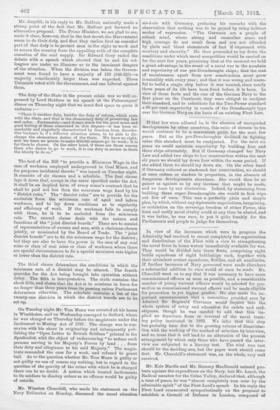In view of the increases which were in progress the
Admiralty bad resolved to recast completely the organization and distribution of the Fleet with a view to strengthening the naval force in home waters immediately available for war. They would be divided into three fleets, comprising eight battle squadrons of eight battleships each, together with their attendant cruiser squadrons, flotillas, and all auxiliaries. If further increases of Navy personnel were made elsewhere a substantial addition to ours would at owe be made. Mr. Churchill went on to say that it was necessary to have more commissioned officers as soon as possible, and a considerable number of young warrant officers would he selected for pro- motion as commissioned warrant officers and be made eligible for promotion to yet higher grades. He also made the im- portant announcement that a committee presided over by Admiral Sir Reginald Custance would inquire into the whole system of entry and education for cadets and mid- shipmen, though he was careful to add that this im- plied no departure from or reversal of the naval train- ing policy instituted in 1892. We infer that this step has probably been due to the growing volume of dissatisfac- tion with the working of the method of selection by interview, and we trust that it will lead to an alteration of the present arrangement by which only those who have passed the inter- view are subjected to a literary test. The viael voce test should be the deciding one, but the paper work should come first. Mr. Churchill's statement was, on the whole, very well received.






































 Previous page
Previous page